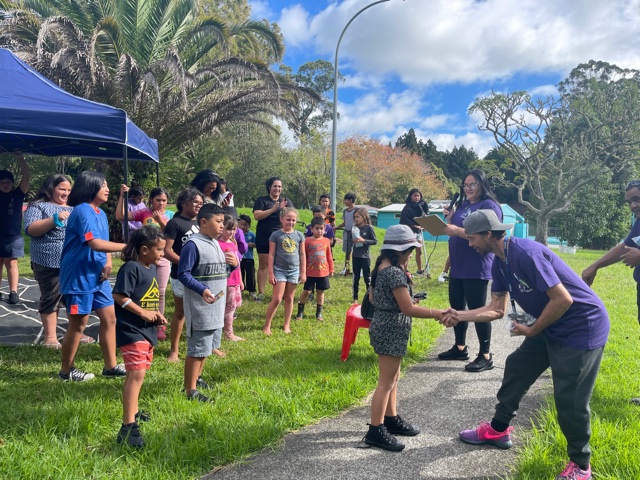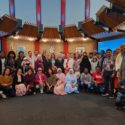This story is one in a series profiling the eleven finalists in the inaugural E Tū Whānau Ann Dysart Kahukura Award 2022 which recognises and celebrates inspirational community leadership.
E Tū Whānau kahukura are those people who support, encourage and strengthen whānau by modelling values, behaviours and actions that are positive ‘footprints’ that can be followed.
Kaitāia Social Service agency, Waitomo Papakāinga Development Society, is a trailblazer. Steeped in whanaungatanga and guided by the principles of tika, pono and aroha its kaimahi have, for the last 30 years, used a Te Ao Māori approach to meeting the diverse needs of their hapori. The E Tū Whānau kaupapa and values are woven into the fabric of what they do. They reverberate through all of their mahi, exemplifying Te mana kaha o te whānau! The power and strength of the whānau!
The agency’s successful strategies for keeping young people culturally, physically, and emotionally safe have influenced politicians and legislators, and opened doors for other iwi and non-government organisations to do the same.
After years of lobbying, and educating, politicians and officials, this family-centred powerhouse of whānau and community development became the first non-iwi Māori organisation to sign an agreement with Oranga Tamariki. This allows its social workers to place tamariki who need care with safe whānau and keep them out of the problematic state system.
In another ground-breaking move, Waitomo Papakāinga Development Society and their collaboration-whanaunga, Te Kahu Oranga, have opened the first Social Supermarket in Te Tai Tokerau. Their pātaka allows whānau to choose grocery items from a wide selection of food and essentials in a normal supermarket environment, instead of collecting a pre-selected food parcel.
Waitomo Papakāinga Chief Executive, Katie Murray, has been prominent in the iwi-wide struggle to keep tamariki Māori within whānau and the communities to which they’re born. She was involved in the establishment of the E Tū Whānau movement and was an original and long-time member of the Ministry of Social Development’s Māori Reference Group. Katie has received multiple awards for her service to Māori and the community including the New Zealand Order of Merit.
Rawiri whānau step-up
Waitomo Papakāinga has its origins in the socially progressive and entrepreneurial spirit of the Rawiri whānau.
The close-knit Rawiri siblings were bought up in Auckland in a materially frugal but loving and violence-free home by parents who believed in them and taught them that, whatever happened in life, they always had each other.
When the six brothers and five sisters began returning to their turangawaewae in the 1970s, they were able to fully enjoy the strong connections with whānau and whanaunga they’d made during childhood trips home to their kainga in Herekino.
Unemployment was high in Kaitaia at the time, so the Rawiris started a couple of small businesses. These included a café with affordable food and a welcoming atmosphere. In it, whānau could relax and talk about their lives and everyday problems they and their mokopuna were facing. One sister, working as a nurse in Kaitaia Hospital, told her siblings heart-breaking stories of the poverty in which some whānau were living. The Rawiris understood the social and cultural disconnection and day to day struggles faced by many in their community and began organising holiday programmes for tamariki and sporting events for everyone. Funding was scarce so their original social work initiatives were propped up by profits from the family businesses.
Powered by the knowledge of their tūpuna and a profound belief in Te mana kaha o te whānau! The power and strength of the whānau!, they sought opportunities to make life better for everyone in their rohe.
Waitomo Papakāinga Development Society – meeting whānau needs regardless
These days, Waitomo Papakāinga is still an efficient, multi-generational whānau enterprise, but it has grown. It now has a staff of 35, including volunteers. Whatever their roles, these kaumātua, pakeke, and rangatahi are always engaged in the day-to-day business of listening, providing awhi and offering targeted assistance to anyone who needs their help.
Whānau also have the option of working with a tohunga who uses traditional practices to provide spiritual support and tikanga-based ways of dealing with life’s challenges.
Waitomo Papakāinga kaimahi also provide homeless whānau with emergency shelter and whānau experiencing financial hardship with food parcels, short term financial assistance and financial mentoring. They run services and support for whānau who are engaged in the justice system. They help others in their dealings with Government agencies like WINZ and Oranga Tamariki. They work with rangatahi and help them find employment.
If there is a need, Waitomo Papakāinga kaimahi will find a way to meet it. Their open-door policy means that anyone who walks in through those doors, regardless of their kaupapa or take (issue), will receive manaaki and assistance.
Kaimahi make use of their extensive connections within the community, both personal and professional. Their ‘co-lab’ arrangement with four Māori providers working in the areas of mental health and whānau wellbeing means they can all share knowledge and work together to make positive changes in the lives of whānau struggling with similar issues.
The collaborative partnership that Waitomo Papakāinga initiated between police, other iwi and Māori providers has also paid off. It allows local social workers to visit whānau when they come to police attention, primarily because of family harm incidents.
These are just two examples of how whanaungatanga has helped reduce family violence in Kaitaia and the surrounding rohe.
Whanaungatanga with no limits
Their whanaungatanga goes way beyond their rohe Te Hiku o Te Ika. Waitomo Papakāinga has developed a strong relationship with the Ma Mawi Wi Chi Itata people of Winnipeg, Canada as part of ongoing and future-focused efforts to build bonds and share knowledge with indigenous peoples around the world.
Thirty years ago a family brought up within the traditions of their tūpuna, with strong Māori values and an unshakeable belief in the power and strength of whānau, saw a need and worked together to address it. The all-encompassing social service infrastructure they and their community have built in Te Hiku demonstrates clearly to everyone in Aotearoa that positive change is possible, and that whānau are the ones to do it.
Mō ngā whānau āke tonu atu, āke, ake, ake.
For all whānau, forever.

Want more?
Learn about E Tū Whānau kahukura and the whakapapa of the concept
Read about the vision, values and journey of E Tū Whānau
Join the E Tū Whānau communities on Facebook, Instagram and YouTube.



